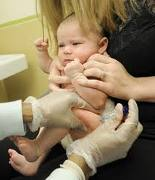 Millions of babies and children could soon be protected against the deadly disease pneumonia[肺炎].
Millions of babies and children could soon be protected against the deadly disease pneumonia[肺炎].
Two leading drug companies have agreed to supply vaccines[疫苗] against pneumococcal[肺炎球菌的] disease to the world’s poorest countries at a reduced price.
Pfizer and GlaxoSmithKline signed the historic Advance Market Commitment Agreement last week. The Global Alliance for Vaccines and Immunizations, or GAVI, helped negotiate the deal. The group says the low cost vaccines could save as many as seven million lives by the year 2030.
The World Health Organization says pneumonia kills almost two million children each year. This is more than AIDS, malaria[疟疾] and measles[麻疹] combined. It is the leading cause of death among young children. And more than 90% of those deaths happen in the developing world.
These are all reasons why GAVI chose the pneumococcal vaccine for its first Advance Market ommitment project. The private-public partnerships are designed to increase the availability of low cost vaccines in poor areas.
Last year, the governments of Italy, the United Kingdom, Canada, Russia and Norway joined with the Bill and Melinda Gates Foundation. They
provided one and a half billion dollars to launch the pneumococcal vaccine project. Jeffrey Rowland is with the GAVI alliance. He says the money helps to persuade drug makers to take part in the project.
Rowland: The biggest challenge of getting life-saving vaccines to poor countries is that there’s no market. People can’t afford them. That’s why we don’t really have a malaria vaccine yet, because no one in rich countries really suffers from malaria.
What we did for the pneumococcal vaccine was we said we will pay 1.5 billion dollars if you develop the right vaccines, and the right volumes that we need and at the right price. And it was a gamble.
That gamble paid off. GlaxoSmithKline and Pfizer have agreed to provide 30 million doses of the vaccine each year for ten years. The first 20% of the vaccines will sell for seven dollars a dose. The remaining 80% will cost three dollars and fifty cents per dose. That is 90% less than
current prices in the United States.
Mr. Rowland says the agreement is a huge achievement for the developing world.
Rowland: Vaccination, which we tend to take for granted in countries like the United States or in Western Europe, in fact a lot of us don’t even know which diseases we’ve been vaccinated against. That’s not the case in poor countries.
Vaccination is a life-or-death question for poor people. And if you can vaccinate a child to prevent a disease from happening, it is a lot more cost-effective than it is to treat that disease afterwards.
不久之后,数以百万计的婴儿和儿童便能获得保护,对抗致命的肺炎。全球最大的两家药厂已经同意以低价向世界上最贫困的国家提供抗肺炎球菌疫苗。(美国)辉瑞制药和(英国)葛兰素史克于上周(3月23日)签署了一份具有历史意义的《先进市场推动疫苗协议》。全球疫苗免疫联盟(GAVI)为该协议的谈判工作提供协助。该组织表示,到2030年,低价疫苗能挽救多达700万人的生命。
世界卫生组织表示,每年有近200万名儿童死于肺炎。这个数字超过艾滋病、疟疾及麻疹死亡人数的总和,可谓低龄儿童的头号杀手。其中90%的死亡病例发生在发展中国家。
以上皆是GAVI将抗肺炎球菌疫苗首先列入《先进市场推动疫苗协议》项目的原因。这种公私合作关系的建立,可以让贫困地区获得更多低成本疫苗。
2009年,意大利、英国、加拿大、俄罗斯以及挪威政府携手比尔及梅琳达·盖茨基金会,提供15亿美元来启动这个抗肺炎球菌疫苗项目。来自GAVI的杰弗里·罗兰表示,这笔资金对推动制药企业加入该项目起到很大帮助。
罗兰:为贫困国家提供救命疫苗的最大挑战是没有市场。当地人根本买不起。这就是为什么我们迄今还不具备真正的疟疾疫苗的原因,因为在富裕国家没人会患疟疾。我们为抗肺炎球菌疫苗所做的就是告诉制药企业,只要你能生产出合适的疫苗,并以合理的价格和所需的容量供应给我们,我们就会提供15亿美元的资金,这可以说是孤注一掷。
这个赌注押对了。葛兰素史克和辉瑞制药已经同意每年提供三千万剂量的疫苗,为期十年。最先供应的20%的疫苗将以每剂7美元的价格销售;而后80%的疫苗单价为3.5美元,比美国目前的价格便宜了90%。
罗兰先生称,该协议对于发展中国家来说是一项极其伟大的功绩。
罗兰:疫苗接种在美国和西欧等国家里再普通不过了;事实上,很多人并不知道我们所接种的疫苗用于抵抗何种疾病。但贫困国家的情况却有天壤之别。对于穷人来说,疫苗接种是一个生死攸关的问题。另外,如果你让孩子接种疫苗,防患于未然,这远比事后治疗更符合成本效益。
